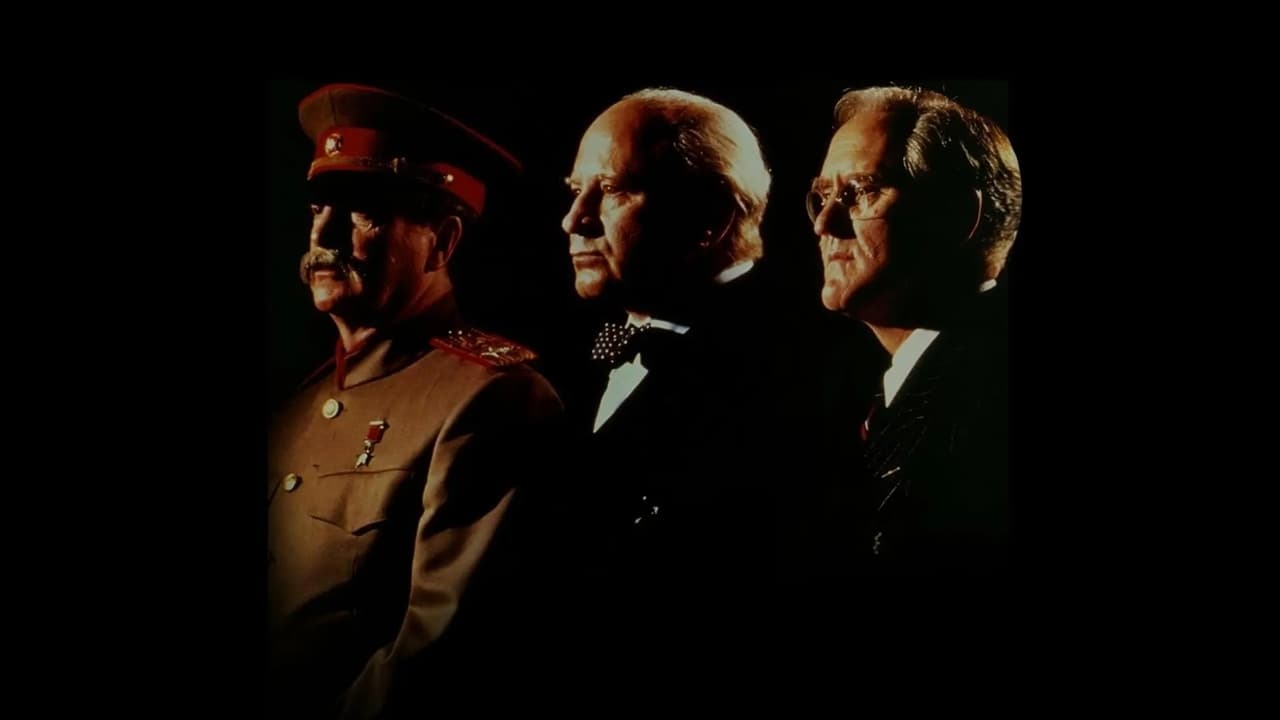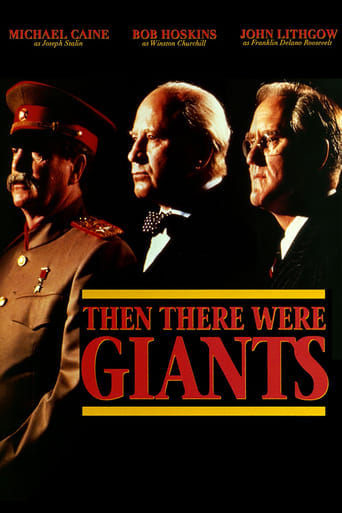

So much average
... View MoreGreat movie! If you want to be entertained and have a few good laughs, see this movie. The music is also very good,
... View MoreEasily the biggest piece of Right wing non sense propaganda I ever saw.
... View MoreWhile it is a pity that the story wasn't told with more visual finesse, this is trivial compared to our real-world problems. It takes a good movie to put that into perspective.
... View MoreWhen the film changes history before it gets to the 1/3 point I could not take it anymore. Did you know that the USA and Japan were at war on Dec 7th 1941? Yes we all know that. But, did you know that the USA was not at war with Nazi Germany until 4 DAYS later when Hitler declared war on the US? Well, you sure wouldn't know that by watching this film because it's never mentioned! Hey, if I'm going to watch a 3 hour film about history they better get it RIGHT! I had objections with parts of the film before that, I think a lot of it is speculation. All the talk about helping the USSR before Pearl Harbor from the US is pretty bogus. We did start to ship them war materials but Russia paid for them in gold and in 1941 it was a small fraction of the amount sent after the USA entered the war. Here it has FDR saying double this and do that to help our Allie, this is BEFORE Pearl Harbor in the film, we were not Allies yet, America was neutral. Then there is this shock when FDR gets the message that Pearl Harbor has been attacked with his character saying I tried to keep America out of the war. Whatever. Hard to believe when the facts are so wrong. I stayed with it to see the moment after Pearl Harbor and the debate from the British side about the USA going to war with Germany, but it never happened in the film. That was a really interesting story to retell, crazy that they didn't go there, maybe they didn't know themselves when they made the film? I suspect that it is because they did not want a Hitler character to overshadow the main 3 that the film is about, which it no doubt would have, but by doing so you are only getting half the story and a flawed one at that since it omits reality. I should give it a lower rating but I realize it's a dramatized retelling and not totally based on fact so I give it a 6 of 10, just out of respect to the production values and actors involved. Another reviewer said this is worth watching only if you are a history buff. I disagree, if you are a history buff this will probably anger you when they retell history differently from what actually happened.
... View MoreThis everlasting subject of the relations between the three major leaders in charge of defeating the Nazis and settling a lasting peace in the world benefits here of an original staging.All along the movie the director gives us the impression that a dialog was set between the three leaders, while in reality we know it was a dialog between deaf guys.Churchill knew from the beginning that Stalin was a liar, deceitful rascal, FDR was already too ill to oppose the cynical Stalin and had to sustain the eternal isolationism of the American people (we must really thank Japan for Pearl Harbor because otherwise Europe would be one of the Nazi provinces), Stalin was in Russia murdering his opponents, fighting against Germany and would have probably concluded a separate peace treaty with the Nazis if Churchill and FDR had not fallen into the trap he presented them at Yalta.As far as the casting of the three head of states, the poorest choice was Bob Hoskins impersonating Churchill. He did not have the looks, he did not master the speech. Michael Caine makes a splendid impersonation of Stalin although his face is still far from the dictator's one. John Lithgow is a very credible FDR. As for Harry Hopkins there is no resemblance but this is not important in itself. Molotov aka Jan Tríska was not a bad choice.There are of course errors in the staging. Stalin used always an interpreter. I'm not even sure he could speak English.As for the historical facts they are accurate as you can't change such important events which shaped the world history and the fate of millions of people.The merit of the movie is it emphasizes the blindness of the USA President as regards USSR and the sinister cynicism with which poor Poland and many other eastern countries were treated and still are.Nothing has changed since, the USA are always the poorest international diplomats abroad because of their stubbornness to impose their language to the rest of the world forgetting that to understand a foreign country's culture and mentality it is mandatory to speak its language. We've seen the result in Irak, in Vietnam, in Egypt, in Lybia and in Afghanistan now. Force is not the sole solution, it generates humiliation and anger. That was the case with Germany which lead to WWII and the Nazis.Will the lesson be understood one day? I doubt, splendid isolationism which was before the attribute of England, is now anchored in the USA's people mentality whatever their leaders' declarations may be....
... View MoreThis docudrama covers the period from Germany's invasion of Poland in 1939 to the end of the war in Europe in Spring, 1945, and concerns the interactions -- both personal and political -- of Winston Churchill, Franklin D. Roosevelt, and Josef Stalin.Kids, this war was called "World War Two". The reason it's called "World War Two" is that it came after "World War One." Churchill was the Prime Minister of Great Britain. He was short, fat, bald, and smoked cigars. He was a good guy though, even though he smoked. Stalin smoked a pipe and combed his hair straight back and had a vicious mustache. But he always smiled, even when he was murdering friends. He was a "communist" but was on our side at the time. Franklin D. Roosevelt was one of the presidents of the United States. He smoked too -- cigarettes in a holder. He would never be elected a president today because he smoked. He couldn't walk either. They'd tear him apart in the press; he wouldn't have a prayer. The moral to this is that if somebody offers you a cigarette, don't take it, unless it has no label and is wrapped at both ends. Then it's okay. Thank you for your attention.The miniseries is necessarily sketchy but not hard to follow. Most of the dialog must have been taken from formal speeches or personal memoirs because that's exactly what it sounds like. The director uses a split screen to suggest some of the communications between the three leaders. And while some of the meetings are skipped (Quebec, Casablanca) others are covered in more detail (Teheran, Yalta). At the meetings, everyone sits around a table and speaks very diplomatically, sometimes making small jokes that break the tension. It could be shown in a class on communications. "We agree with you, though we are of course concerned about the Baltics" means, "Keep your Commie nose out of Yugoslavia." It quickly becomes clear that, although Churchill and Stalin are both fighting a common enemy, neither trusts the other. Roosevelt is in the middle, always the worried optimist.Considering the limitations both of the material and the medium, you have to give this an extra point or two. It's not only a lesson in geopolitics but it gives us a glimpse into the personalities of the three eponymous lions, and each has a chance to present his point of view. Stalin was a terrible thug, of course, but that has nothing to do with the subject matter dealt with here.
... View MoreI couldn't disagree more with the teenager that watched it for school. This was terrific acting of an episode in history that affects any resident of the world. Well acted by the leading characters, good explanation of the historical context of the situation, and a fascinating portrayal of the differing interests of the three nations involved. I was riveted to it. The stakes involved for each country were enormous beyond belief, and I appreciate that it wasn't trivialized by Hollywood by throwing in love interests, happy endings, and 'awesome' special effects. Rather, it's an editing and re-enactment of actual words, meetings, press releases, etc that nevertheless is very dramatic and straightforward. I have watched this show, and, in addition, the Band of Brothers mini-series, and Patton for a good understanding of the interrelationships, tribulations, and objectives of WW II at the leadership level, the military's level, and at the level of the guy in the trenches. It all makes sense when you put it all together, with each reinforcing the other.Old movies never die, they just fade away (apologies). Frankly, I don't buy many DVDs, but I will be looking for this one!Since I first wrote this in 2004, I have just discovered (May 2007) that it was released on DVD back in Feb. ! I'm anxiously awaiting delivery.
... View More